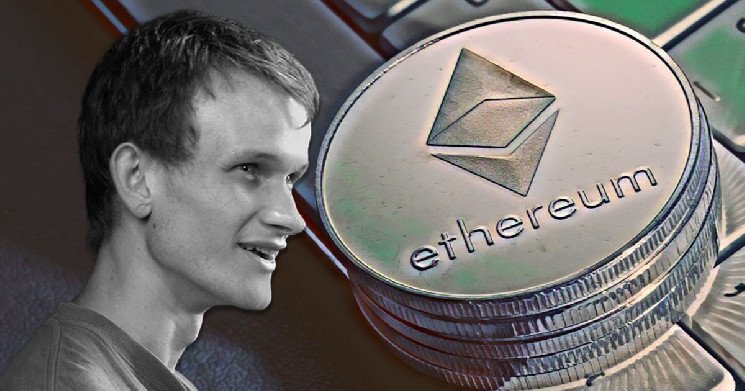What is the future of Ethereum?
This is something that many within the cryptocurrency industry have debated. The network was a game changer with the introduction of smart contracts. This was the first large scale blockchain to implement that. Since that time, the network was forked on a number of occasions, resulting in a variety of EVM chains.
It was also one that moved from the Proof-of-Work (PoW) to Proof-of-Stake (PoS) protocol. This was done in an effort to scale the operations that can be handled on-chain. The long term development plan was to drive down transaction fees.
So far, the network is lagging. Other forks seem to get more attention. Many are quick to highlight the problems with the original chain.
Is this going to continue? Vitalik is working hard to alter the course of things.

Vitalik: A "United" Ethereum
Buterin laid out his ideas in a new proposal.
Proposal EIP-7782 alters how the chain manages fees and scalability. These are two hot points within the community.
On the scalability side, roll ups are key.
Rollups, an Ethereum Layer-2 solution, were specifically mentioned by Buterin as one of the main ways that this change will be implemented. By grouping transactions off-chain and then efficiently executing them on-chain, rollups have already been recognized as a crucial technique to improve scalability. Buterin's plan refocuses on rollup integration to guarantee smooth interoperability and lower user costs.
This seems to be a path to scaling that many are taking. moving transactions off-chain is something that the Bitcoin community did with Lightning Network. These are then grouped and posted to the main chain.
When it comes to the fee structure, we have this:
Buterin's plan also calls for the introduction of new fee-sharing arrangements. EIP-7762 discusses fee-sharing models, which may guarantee more equitable and balanced distribution mechanisms for network users and validators. These modifications may have a substantial impact on how Ethereum's economics unfold for all parties involved as transaction fees have long been a problem.
If we look at the proposal itself, we get more details:
This EIP suggests decreasing the slot time in Ethereum’s Proof-of-Stake (PoS) consensus mechanism from 12 seconds to 8 Seconds. The reduction increases the number of slots per unit time, boosting the network’s transaction processing capacity by approximately 33%.
Unlike directly increasing the gas limit or blob limit; which would raise peak bandwidth demands, this proposal distributes the increased bandwidth evenly over time, preventing spikes in network load and preserving node accessibility for participants with varying bandwidth capacities.
This change requires the implementation of EIP-7623 to adjust calldata costs accordingly and EIP-7778 to remove gas smuggling via refunds to maintain network performance.
The proposal seems to be a step in the right direction. For Ethereum, it is a long path. Upgrades to the network started a number of years ago, right after the conversion to PoS.
So far, the impact was marginal with regards to the performance of the network. One of the reasons other EVMs were able to gain traction is due to the fact that fees were lower along with the transaction throughput being higher. This led for users to opt for alternative networks when moving funds around.
This is evident in the fact that many coins and tokens are now wrapped. These versions are often utilized to a greater degree than the original.
Hive Just Keeps Chugging Along
The move to 8 second block times could be significant. To frame it a bit better, we can look at the 3 second block time on Hive. Here we see the difference in throughput potential.
One of the key issues for many applications are the transaction fees. It is vital to keep in mind that blockchain was formed around the idea of finance. Bitcoin rolled out as a form of currency. That was the thought anyway.
In that realm, transaction fees are common. People are accustomed to dealing with them. There are costs to the network operators which are pushed to the users.
This is simple.
The challenge arises when we get into other areas. An example of this is Netflix. There is a cost for the company to stream each film. Like financial institutions, this company has a cost to network operation. That said, the fees are not placed directly onto the users.
Can you imagine being charged a fee each time you started a film?
Naturally, this is bundled into the cost of the monthly subscription. There are, however, networks, that do not follow this model.
Social media is one where fees are not passed on. Meta spends a huge amount of money to run its networks. Each application is consistently pulling data. At the same time, the database is being written to.
This has a cost yet no fees are charged. Naturally, social media companies operate on a different business model. We know they are all monetizing in other ways.
I long maintained this is a problem for many of the blockchains out there. As long as a direct transaction fees is charged, most things outside finance will fail. Customers (users) are not accustomed to paying that. This is where Hive is different.
It has no direct transaction fees. The ability to write to the network is based upon one's stake.
When it comes to transactions, finance is a heathy users of networks. That said, it pales in comparison to things such as social media.
Here is where Ethereum hits a wall. Even if it was acceptable for finance, many things outside of it such as gaming is zapped from the start. People simply will not pay directly.
Scaling and fees remain a major issue for many chains. This is something that Hive appears to be excelling at.
Posted Using InLeo Alpha